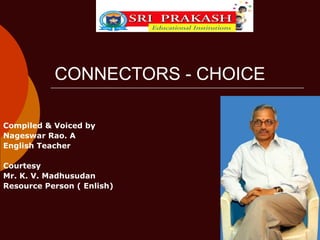Connectors choice.
•Download as PPT, PDF•
0 likes•937 views
Useful for 10th class students.
Report
Share
Report
Share

More Related Content
What's hot
What's hot (20)
The Usage of Both and And, Not Only and But Also, Either and Or, Neither and Nor

The Usage of Both and And, Not Only and But Also, Either and Or, Neither and Nor
Similar to Connectors choice.
Similar to Connectors choice. (16)
Languagelab 3.4 - Master Present & Past Continuous Verbs

Languagelab 3.4 - Master Present & Past Continuous Verbs
More from Sri Prakash Vidya Niketan
More from Sri Prakash Vidya Niketan (20)
ఏ ఏ సందర్బాలలో ఇంగ్లీష్ లో ‘Say’ ‘tell’ ఉపయోగించాలి.

ఏ ఏ సందర్బాలలో ఇంగ్లీష్ లో ‘Say’ ‘tell’ ఉపయోగించాలి.
Connectors choice.
- 1. CONNECTORS - CHOICE Compiled & Voiced by Nageswar Rao. A English Teacher Courtesy Mr. K. V. Madhusudan Resource Person ( Enlish)
- 2. Either/or and neither/nor 1.Either / or - used in a sentence in the affirmative sense when referring to a choice between two possibilities We can either eat now or after the show - it's up to you. 2. Neither / nor - used in a sentence in the negative sense when you want to say that two or more things are not true Neither my mother nor my father went to university. Singular or plural
- 3. When using either/or and neither/nor, note the following rules: 1. If both elements are singular, then the verb is singular too. Either the father or the mother has to attend the meeting. (father and mother are singular; so the verb has is singular too) Neither Leila nor Nancy is going to write the report. (Leila and Nancy are singular; so the verb is singular too) 2. However, if one of the elements is plural, then use a plural verb. Either Radha or the girls are going to prepare dinner tonight. (the girls is plural; so the verb are is plural too) Neither the teacher nor the students were in the classroom this morning. (the students is plural; so the verb were is plural too)
- 4. Visit us at “ayalasomayajula nageswar rao” For More videos on Functional & Usage Grammar. Subscribe to our channel on You Tube
